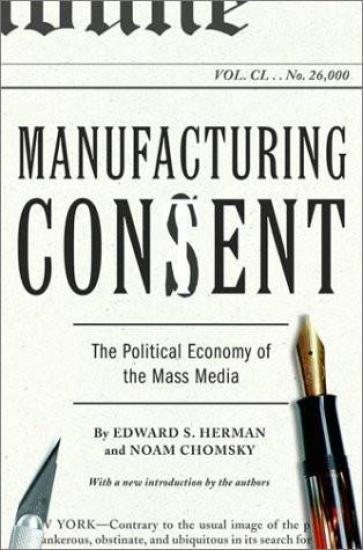
Rating: ****
Tags: Lang:en
Publisher: Pantheon
Added: November 7, 2020
Modified: November 5, 2021
Summary
In this pathbreaking work, now with a new introduction,
Edward S. Herman and Noam Chomsky show that, contrary to the
usual image of the news media as cantankerous, obstinate, and
ubiquitous in their search for truth and defense of justice,
in their actual practice they defend the economic, social,
and political agendas of the privileged groups that dominate
domestic society, the state, and the global order.
Based on a series of case studies—including the
media’s dichotomous treatment of “worthy”
versus “unworthy” victims,
“legitimizing” and “meaningless”
Third World elections, and devastating critiques of media
coverage of the U.S. wars against Indochina—Herman and
Chomsky draw on decades of criticism and research to propose
a Propaganda Model to explain the media’s behavior and
performance. Their new introduction updates the Propaganda
Model and the earlier case studies, and it discusses several
other applications. These include the manner in which the
media covered the passage of the North American Free Trade
Agreement and subsequent Mexican financial meltdown of
1994-1995, the media’s handling of the protests against
the World Trade Organization, World Bank, and International
Monetary Fund in 1999 and 2000, and the media’s
treatment of the chemical industry and its regulation. What
emerges from this work is a powerful assessment of how
propagandistic the U.S. mass media are, how they
systematically fail to live up to their self-image as
providers of the kind of information that people need to make
sense of the world, and how we can understand their function
in a radically new way. An absolutely brilliant analysis of the ways in which
individuals and organizations of the media are influenced to
shape the social agendas of knowledge and, therefore, belief.
Contrary to the popular conception of members of the press as
hard-bitten realists doggedly pursuing unpopular truths,
Herman and Chomsky prove conclusively that the free-market
economics model of media leads inevitably to normative and
narrow reporting. Whether or not you've seen the eye-opening
movie, buy this book, and you will be a far more
knowledgeable person and much less prone to having your
beliefs manipulated as easily as the press.
Herman of Wharton and Chomsky of MIT lucidly document
their argument that America's government and its corporate
giants exercise control over what we read, see and hear. The
authors identify the forces that they contend make the
national media propagandisticthe major three being the
motivation for profit through ad revenue, the media's close
links to and often ownership by corporations, and their
acceptance of information from biased sources. In five case
studies, the writers show how TV, newspapers and radio
distort world events. For example, the authors maintain that
"it would have been very difficult for the Guatemalan
government to murder tens of thousands over the past decade
if the U.S. press had provided the kind of coverage they gave
to the difficulties of Andrei Sakharov or the murder of Jerzy
Popieluszko in Poland." Such allegations would be routine
were it not for the excellent research behind this book's
controversial charges. Extensive evidence is calmly
presented, and in the end an indictment against the guardians
of our freedoms is substantiated. A disturbing picture
emerges of a news system that panders to the interests of
America's privileged and neglects its duties when the
concerns of minority groups and the underclass are at stake.
First serial to the Progressive.
Amazon.com Review
From Publishers Weekly
Copyright 1988 Reed Business Information, Inc.